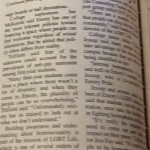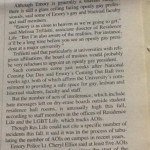I should preface this blog with a warning- I was looking through yearbooks published before 1963 that had little to do with my topic. Luckily my partners found all the sources I ended up using.
I was originally reading these articles and realizing how impressed I was with Emory’s views. While most states prevent same sex couples from receiving the same benefits as their heterosexual counterparts, Emory “Student Health Service Plan is Expanded to Include Domestic Partnerships” [Fig 1]. Issues like these cause nationwide debates, but I liked the direction Emory was taking in this. Reading “Emory Encourages Acceptance of Gays”[Fig 2] was also a refreshing read. Then I stumbled upon a third article.
“LGBT Group says Emory Needs More Tolerance.” [Fig 3] That got me thinking. Emory is enforcing all these new policies the majority student population seems to agree with. Yet there is some intolerance from students, but more surprisingly at universities with a strong tie to religion, the board of trustees seems to be the biggest culprit. This seems highly hypocritical for a group in charge of “establishing policy and exercising fiduciary responsibility for the long-term well-being of the institution” (Overview, Board of Trustees). You have to appreciate that we have people who are going against their beliefs all for the sake of the betterment of the university and its students, although it’s easier to enforce policies when you actually believe in them.
That is where the inconsistencies occur. I’ll map out my train of thought. We have the board of trustees coming out with monumental changes, and although they don’t believe in the policies, they are trying to improve the university. The university looks great from the outside. On the inside though, the same people who are in charge of the policies are also in charge of other facets of the university. Some of these include hiring faculty- gay ones might be discriminated against. Our minds are still forming our principles, yet since we have no diversity teaching us, we seem to believe in the same ideas as the last generation. We are ignorant of the issues.
That is apparent. We witnessed it in class where although some people are not directly affected by same sex marriage, they are against it because they are uncomfortable with it. Uncomfortable. That is not a good enough reason to be opposed to a decision that would affect millions. You can tell me that you believe it will weaken the definition of marriage or even the legality of it. It might be a stretch, but I think the frequency statements like this would decrease with more diversity.
So getting back onto point, the people who are making the rules are simultaneously undermining their own efforts. This seemed like an attack on the board of trustees, and I focused on them because the article in the Emory Wheel did too- I didn’t know who else to scapegoat. Initially I wasn’t expecting my blog to take this turn, but I thought the irony between the articles was worth talking about.
http://www.emory.edu/secretary/board_of_trustees/index.html





